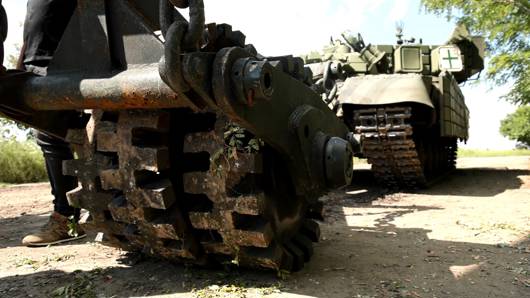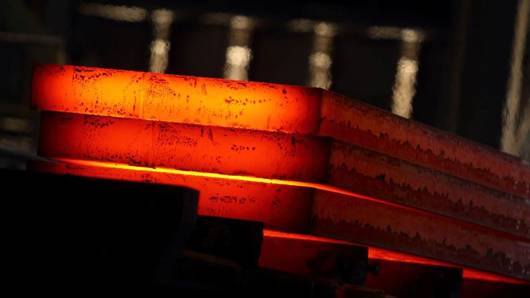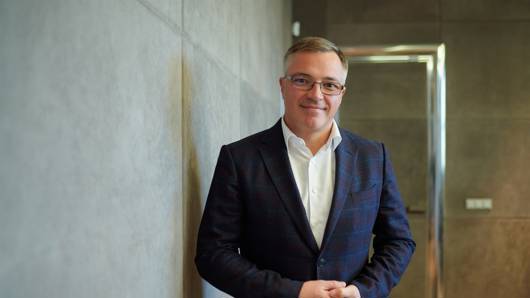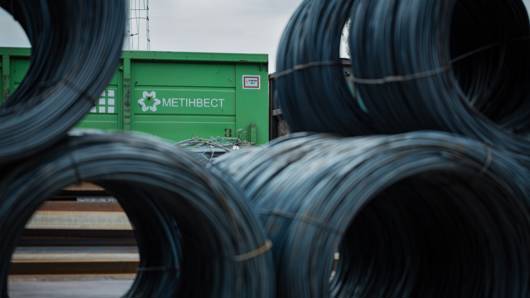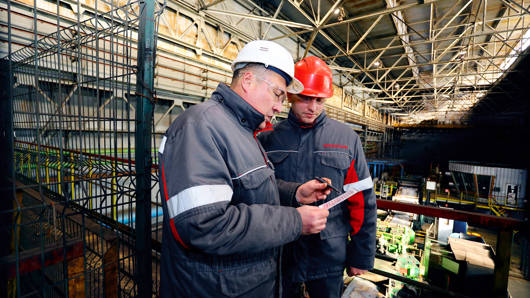In an interview with the Pryamiy TV channel, Oleksandr Vodoviz, head of the Chief Executive Officer’s Office of Metinvest Group, spoke about the Group’s performance in 2023, employee mobilisation and expected government support for business, as well as the most challenging projects to implement to support the army, importance of opening ports for Ukrainian product exports and tasks for 2024.
– Oleksandr, can you summarise the Group’s performance, please.
– It is very difficult to talk about any achievements now. The country is at war. The last year was divided into survivors and non-survivors for any business. Fortunately, we are among the survivors. Our business has probably suffered the most. We lost Mariupol and two large plants. Around 40,000 people worked there. For Ukraine, Mariupol is a major loss for the economy. In general, this involves our people and territory. And for Metinvest, we lost around 50% of our business during this time.
Last year, our main problem, like for all export-oriented businesses in Ukraine, was logistics. Ports and western railway border points were closed, and no one could export their products. In 2021, it was hard to imagine a situation where a business would survive without any logistics whatsoever. But we saved the Group: we managed to make provisions and savings. And now ports have opened, which is a crucial event for us. As such, we still think that we will finish this year at least without losses, somewhere close to zero.
– Metinvest is a large company. On one hand, you already have 8,000 people mobilised. On the other, the Group is one of the companies that helps the country the most. How should the government deal with mobilisation? Should it somehow negotiate so that it is happy and businesses can operate? To ensure that people can work.
– There is no simple recipe here. To find the right solution, everyone has to be a little dissatisfied. Let’s break down the question into several parts. First, some 8,000 of our employees are currently serving in the armed forces of Ukraine. Around 1,000 wounded have already returned, and tragically, 500 have been killed. Overall, some 10,000 Metinvest employees have served in the armed forces. We can look at these figures in an absolute and relative sense. Every sixth employee serves in the Ukrainian armed forces. This is a major load for the business. And we can see that new laws are about to be adopted.
– By the way, what do you think of this?
– We understand the government because there are around 1 million people on the front line. Some have been serving since 2021, and they need to be rotated. The government has to weigh up that there is an economy that supports those who serve. They need to be paid salaries, provided with ammunition and petrol, fed and so on. This money comes from business. For a business to function, you cannot send 50% of its employees to the army. There is a need to find compromises with business. For example, in terms of the tax burden, who and how many people can receive a draft deferral, or how critical is a business? I would ask lawmakers to look at this area more carefully.
In Kyiv, it is easy for us to talk about what mobilisation should look like. The situation on the front line is entirely different. We often go there. Those serving there need to be rotated because some of them have not been home for two to three years. And the government should carry out mobilisation.
– How should the government help businesses?
– It should probably not interfere. We can see how many searches of small and medium-sized businesses were conducted in the middle of the year, and how much tax pressure is exerted. But it seems to me that during the war, the state should have released and allowed entrepreneurs to work, earn money and pay taxes to the country. Because the current view is that if you are an entrepreneur who makes money during the war, you are evil. You are bad, you need to be punished and the tax authorities, the Economic Security Bureau and everyone else should visit you.
The essence of entrepreneurship is not that these people are altruistic. They are looking for different ways to earn money. In this way, they earn money and pay taxes and therefore the country develops. However, they are being told: “No, you don’t have the right to earn money.” There is such a dilemma, and I am very surprised that even during the war, this perception of business has not changed. We still see business as something bad, and people who want to make money are also bad. And when there is a war, you have to close down. But these are the drivers of the entire economy. People on the front line receive salaries from those who work here: from businesses. The salaries paid by businesses are used to cover personal income tax, pensions and social security.
– How much tax have you paid this year? Isn’t it a huge amount?
– In 2023, it will be over UAH14 billion.
– What amount of support has Metinvest provided to the armed forces of Ukraine to date?
– The Group has allocated around UAH5 billion to support the army. In total, however, Rinat Akhmetov’s Steel Front has spent UAH6.7 billion. This is a large figure. No other business spends more than that. We wish that all businesses had the same attitude to the war as we do. We worry and spend vast resources. For example, the financial and economic specialists at Metinvest’s project office have already become experts in drones, thermal imagers, clothing and military science. Many people feel for the army with their hearts and souls, and I think Metinvest is doing the most. We are now number one among private businesses in the country in terms of support.
Many soldiers thank us. And we tell them: “We are doing this because our children will live here, and we thank you. We are rooting for our country. And we want Russia to lose.”
– At Metinvest, you visit the front line a lot and help the Ukrainian armed forces. What were the most challenging tasks in doing this that you managed to accomplish?
– I would say that this was at the beginning of the war, when people on the front line did not have bulletproof vests. Everyone has already forgotten the March-May period, when people were queuing at military registration and enlistment offices and going to the army on their own. Since then, we have produced and purchased some 150,000 bulletproof vests. Back then, every second bulletproof vest on the front line was from Metinvest. We learnt how to make bulletproof vests ourselves, which is also a considerable achievement.
After a while, we focused on the needs of the special forces. We recently delivered boats worth around UAH120 million. These are for special operations by special forces in Crimea, Black Sea defence, Odesa ports and so on.
– You mentioned ports. We have been hearing this word for the past year. What are the nuances, problems and achievements, and what will happen next?
– Metinvest has probably been raising the topic of ports for the last year. We have had many discussions with the Ministry of Infrastructure. I would like to thank Minister Kubrakov, who was personally involved in this process. He negotiated with the United Nations, and within the country, and knocked on the door of the president’s office to show that our ports account for 10-20% of GDP. Ukraine has always been an export-oriented country. We have always exported agricultural products, ore and steel. Everyone has realised that we cannot export anything by land, without ports. Only one sixth of the volume that we export by sea can be exported by land, and this has stopped.
The Federation of Employers has estimated that the opening of ports will bring in US$20 billion a year. This should be added to the tens of thousands of people who will receive jobs and salaries. As such, I think that the opening of ports has been somewhat underestimated. We need to clutch at it like at a straw that will rescue all of us. When we opened ports in 2023 and realised that the Russians could not do anything about it, it was a very significant event.
– What are your tasks for 2024? In your opinion, will next year be any less challenging?
– Everyone is aware of what is happening with the assistance of our Western partners. When ports were closed, the Americans must have sent some signals to us that the aid would not last forever, and we had to think about where to collect taxes and how to finance the budget. Perhaps that’s why our authorities stirred, as ports reopened fairly quickly.
For Metinvest, I think that 2024 will be a year dedicated to veterans. Around 10,000 of our employees have served or are currently serving in the armed forces. We have many people with disabilities returning from the war. We are waiting for all of them, and we are preserving jobs for all of them. We would like these veterans, who shed their blood and sacrificed their health for us to live, to come back and work. We will have various programmes related to veterans. We want to implement these together with our American partners, who will demonstrate the right way of doing this. They have extensive experience of the Vietnam War, when their veterans were returning from there.
We will be moving in this direction because sooner or later, 1 million Ukrainians will start returning home from the army. Most of them will have mental and physical trauma, and there will be many guns in people’s hands. I think that we will face quite difficult times even after the war is over. We need to work with these people. And we are ready to work. We are allocating substantial funds for this. In addition to not reducing our support for the army, we will dedicate 2024 to working with veterans.
– Oleksandr, what were your personal achievements in 2023? Do you have any plans that we can talk about? What is your hobby?
– I love extreme activities such as motorbikes and fast driving. However, a lot has changed since the war started. Some personal hobbies have faded into the background. Everyone has someone in their family who either serves or is somehow involved in the war. One of my brothers went through the war in Afghanistan, and another is serving in the armed forces somewhere near Donetsk. Security guards from our office have joined the army, and our colleagues are coming together to help them as much as they can. Everyone knows someone who has been wounded or killed. Despite everything, we have to maintain a cheerful attitude and take care of our loved ones. We believe in the armed forces of Ukraine. We believe in our victory.






